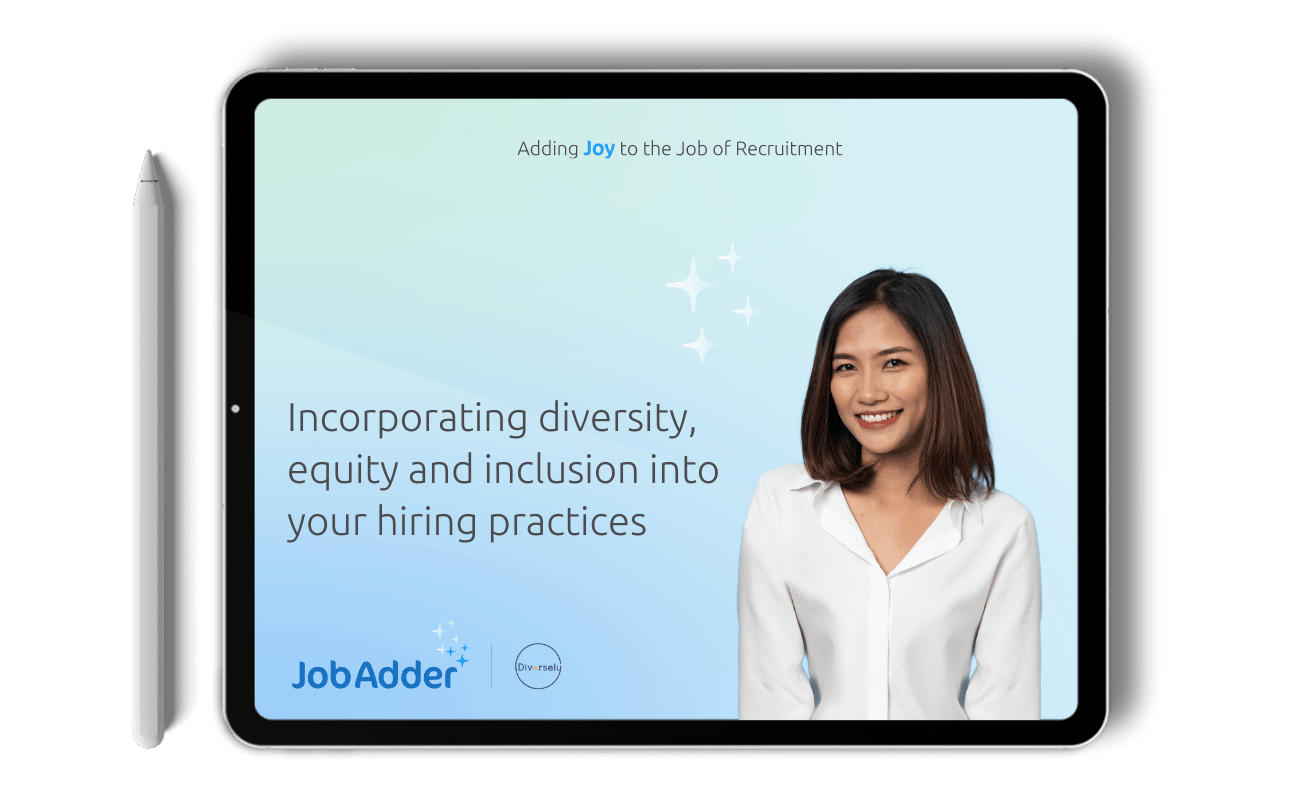With the abundance of open positions in the market now, it’s highly competitive, so finding potential candidates to fill a management role can be incredibly overwhelming.
You want to select the right person for your management role, and a key part of that hiring process is asking the right interview questions and getting the right answers.
Below, we’ve broken it all down with 11 of our best interview questions for managers to help you find the right candidate.
FREE EBOOK: Incorporating diversity, equity and inclusion into your hiring practices
What to look at before selecting job interview questions
One of the most significant parts of the interview process is asking the right questions. How you structure the questions will determine the answers you get, so you need to know what you’re on the lookout for.
Conducting the interview process without knowing what answers you need is not productive, so identify some sample answers to ensure that your hiring managers recognise the right qualities.
Before interviewing candidates, the hiring manager should select management interview questions and answers they feel fit the organisation’s needs. Before picking questions for the interview, you should consider:
Position level
You don’t want to ask the same questions for an entry-level management position as a senior-level manager. You need to know if you’re hiring a project or line manager.
The type of management jobs you’re interviewing for plays a significant role in the questions you’ll ask. The questions identified should reflect the level of responsibility and experience needed.
Review their work experience
Before interviewing your management candidates, you should dissect their resumes and applications.
Look at the types of jobs they’ve held before and identify similarities with your position. Reviewing their work experience will help you identify areas you want to ask about during the interview.
Re-read the job description
You can’t organise a successful interview process without knowing the requirements for success in the position.
Before selecting interview questions, review the job description and ask questions that will help ensure the candidate meets the position’s requirements.
When selecting new management candidates, the interview process is critical. If you want to know how to spot a bad manager during an interview, using behavioural interview questions is vital. Simple questions about procedures or standard operations won’t help you get a holistic view of how they lead or manage.
Behavioural interview questions will allow you to understand how the candidate responds to certain situations. To identify the best behavioural interview questions for managers, you need to know what behavioural traits your position requires.
Once you have your questions, review with your hiring team the example answers that you would expect to hear. Highlight specific terms and items you’re looking for so everyone knows what you’re looking for in a candidate.
Top 11 interview questions for hiring managers to ask potential management candidates
When considering questions for management positions, you want to learn about the candidate’s knowledge and abilities. Knowing where they went to school or if they can complete a process is nice, but for management positions, you want an employee who has communication skills and problem-solving skills.
These are the people you trust to lead your organisation and coordinate with your work teams. If they can’t communicate effectively or think on their feet, they shouldn’t be in a management position.
To help hiring managers identify whether a candidate will be successful, we have compiled a list of our top 11 interview questions. These interview questions will allow the hiring manager to learn about the candidate’s work ethic, communication skills, relevant experience and problem-solving skills.
While you should tailor the interview questions to the specific candidate and position, this list compiles some of the best interview questions that should make your final cut.
Here is the list:
- What do you know about our company culture?
- What is your biggest weakness? Greatest strength?
- What management style resonates with you the most?
- Tell me about a time when you had to make a difficult decision.
- Describe your communication style for day-to-day work.
- How would you describe your leadership style?
- What are your future career goals and personal goals?
- What past experience do you have in a management role?
- How do you motivate your team members?
- What do you think makes a successful management team?
- Give a specific example of when you used conflict resolution in your work.
While some of these interview questions may seem obvious, they’re tried and tested for a reason, and they yield interesting and revealing answers.
What do you know about our company culture?
When you hire a management candidate, you want someone who fits in well with your existing team. You also want someone who has done their research and understands your company culture.
All too often, candidates use the shotgun method for applications and don’t take the time to research the positions they’re applying for. Top-quality candidates will research a company before even applying to ensure they’re a good fit. (One caveat I would add here is that sometimes if a candidate has applied to multiple jobs, or applied a while ago, they may not recall your company or culture perfectly!)
Asking about company culture and communicating the strengths of your culture helps lead to higher-quality candidates, as they’ll understand the work environment before starting.
Experienced candidates will have a good idea of your company culture and work environment before applying, often through review sites like Glassdoor. An external candidate may not know all the ins and outs of your company environment, but if they can’t tell you anything about the existing culture in your organisation then steer clear.
What is your biggest weakness? Greatest strength?
While these two common manager interview questions may sound cliche, they can provide significant insight into the candidate’s skills and willingness to learn. These questions are a great way to discuss your management candidate’s soft skills.
When talking about these questions with job seekers, you’ll want to listen carefully and compare their answers to the information in their resumes. You’re looking for candidates that are open and honest about their capabilities.
Job seekers may relate this question to the requirements outlined in your job description. When they do, ensure they have the skill set needed for success. These questions can be tough interview questions for managers to answer.
However, a good leader always self-evaluates to ensure they do what they can to improve the team. In particular, if they’re not prepared to discuss their weaknesses, this should be a serious interview red flag.
Want to improve diversity in your recruitment? Access our free eBook with Diversely now.

What management style resonates with you the most?
Anyone with more than a few years of experience has likely dealt with multiple management styles. Some fields require a more direct, rigid management style, whereas others can be more open and relaxed.
You need to find out what management style the candidate prefers and understand how that relates to your company culture.
Unless you hire an entirely new team, the incoming manager will need a management style that works well with existing team members.
The new manager will have to coordinate and communicate well with their direct reports and learn some nuances on the job. They must have a management style that team members respect.
Finding out the candidate’s preferred management style is essential, but candidates should also be able to adapt their management style based on the communication needs of their team members.
Tell me about a time that you had to make a difficult decision
Organisations hire managers to do one key thing: manage. Managing means problem-solving, making decisions and leading your team members. Successful managers must have the skill set to make decisions, often quickly, to keep the organisation moving.
Decision making is one of the most critical skills for managers. Managers need to have the capability to make quick decisions to support their team members.
When asking this question, hiring managers should listen to see if the candidate can provide an example of a difficult decision. It’s crucial to know what types of decisions the position requires. The candidate should provide a response highlighting their ability to make timely decisions comparable to those required by your organisation.
Make sure their idea of a difficult decision is actually what you would consider a difficult decision. Look for their answer to give examples of their problem-solving skills. Ensure their level of problem-solving is what you expect of your team members.
Describe your communication style for day-to-day work
Poor communication is one of the top signs of a bad manager. Managers must be able to communicate clearly with staff members and ensure the company vision is followed. If the manager you hire has a communication style that doesn’t align with the team members, you’ll experience issues.
Communication styles can vary from person to person. Some prefer a direct hands-on communication style, while others prefer to remain in the background.
As a hiring manager or talent acquisition professional, you need to know what communication style works in your organisation and select a candidate that can operate in that style. While your team and organisation may have a preferred communication style, a successful leader must be adaptable.
Therefore, look for a candidate that can successfully utilise multiple communication styles. A flexible candidate will communicate with team members and their managers more effectively.
How would you describe your leadership style?
Just as everyone has a communication style, everyone has a leadership style, and both can shape success and productivity.
Some leaders want to be right in the action, working side by side with the team, while others are more about operating in the background.
Leadership skills are critical for managers. Team members rely on managers for support, and having a strong leader is necessary. Matching the right leader with your team will ensure team members receive appropriate support, advice and feedback.
Ensuring the new manager has a leadership style that aligns with company values is vital. Asking the candidate about their leadership style will allow you to understand how they work with their team.
Use this question to dig into their leadership skills and determine whether they’re a good fit for your team. Ensure that the candidate you select is flexible enough to adapt to different styles as necessary.
What are your future career goals and personal goals?
Learning about the candidate’s personal goals and career goals is an often overlooked question. Most hiring managers assume that a candidate’s career goals and personal goals align with the company’s values, which is not always the case.
Therefore, it’s critical for the hiring manager to determine if the role is a good fit for the candidate’s career and personal goals.
Also, learning about the individual’s desire for future career advancement can help in succession planning. When hiring, especially for management positions, you should always consider how the candidate and their career goals align with the company’s growth objectives.
You’ll want to find someone who can not only fill the current position but who will be able to grow and progress within the organisation. Asking this question can help determine if the candidate is serious about wanting to work with your organisation or just using you as a stepping stone to the next job.
What past experience do you have in a management role?
Before interviewing any candidate, the hiring manager should always review their previous experience on their resume and application. If they don’t have the appropriate experience listed on their resume, they shouldn’t even be getting an interview.
This interview question is about more than the candidate listing off their past jobs. This question will give you a perspective on how the candidate feels their experience is relevant to the position. It will also help expand the conversation on various experiences they have had in the past that may not be on their resume.
Hiring managers should ask follow-up questions about previous management experiences that were successful and those that were less than successful. These types of questions will highlight a candidate’s strengths and weaknesses.
How do you motivate your team members?
Motivating team members is one of the key qualities of a good manager. Successful leaders need to work with their direct reports to build a culture of teamwork. Without a healthy teamwork environment, most managers will fail.
It’s crucial during the interview process for recruiters to find someone that will work well with the current team and motivate them in a healthy and productive way.
What do you think makes a successful management team?
Successful management is not just about working with direct reports but also requires working as a part of a management team. After you learn about the candidate’s management style, you’ll want to ask this follow-up question to see how well they will work with other managers in your company.
This manager interview question lets you explore what your candidate thinks about the current management team. Plus, getting their thoughts on what makes a successful management team provides insight on how they’ll align with your current team and company values.
Give a specific example of a time you used conflict resolution in your work
It’s often said that managing would be easy if it weren’t for people. Dealing with interpersonal relationships and conflict resolution is a critical component of management. Successful managers need to exhibit conflict resolution skills, whether working in human resources or tech.
This question is a great behavioural interview question, as it allows the candidate to discuss their previous experience and how they dealt with conflict. Hiring managers should pay careful attention to the responses to this question.
The candidate’s answer will provide insight on how they may work with the rest of the team, what your candidate sees as conflict and how effective they are at resolving conflict.
Discover more best practices for hiring with JobAdder
Identifying the best interview questions for managers will help determine whether a management candidate is the right fit for your organisation. Reviewing the candidate’s qualifications, management strategies and communication skills is critical to finding the right candidate.
While it’s up to the hiring manager to ask the right questions and dig deeper to gather the necessary information to choose the best candidate, a large part of a successful hiring strategy is getting good candidates in the door.
Companies need a candidate sourcing and hiring process that’s constantly improving and streamlining. Keeping up with the ever-changing world of recruiting requires significant effort. Smart organisations utilise cutting-edge technology to keep ahead of the curve.
JobAdder can help you get more qualified candidates to fill your company’s open positions. As a recruiting software, we empower you to automate and optimise your hiring process. JobAdder’s CRM and ATS can streamline your application process and make hiring successful management candidates less stressful. To learn more, book a no-obligation, quick demo now.




